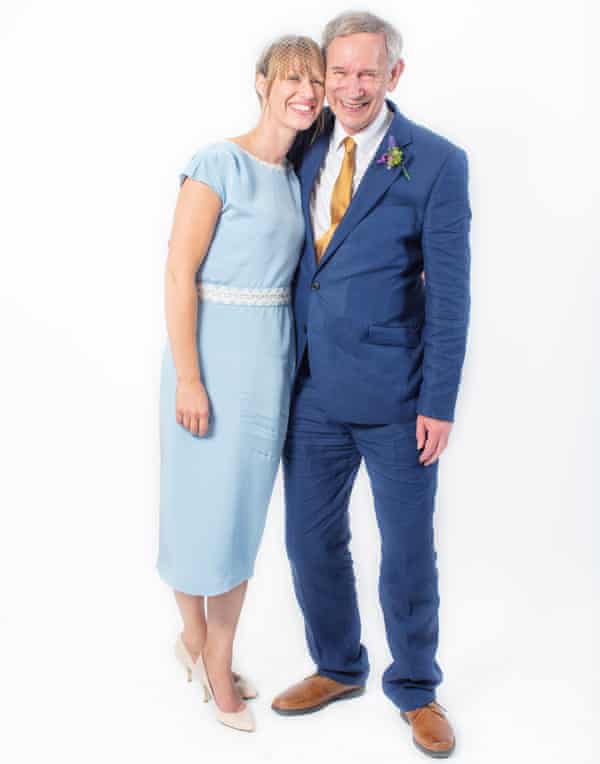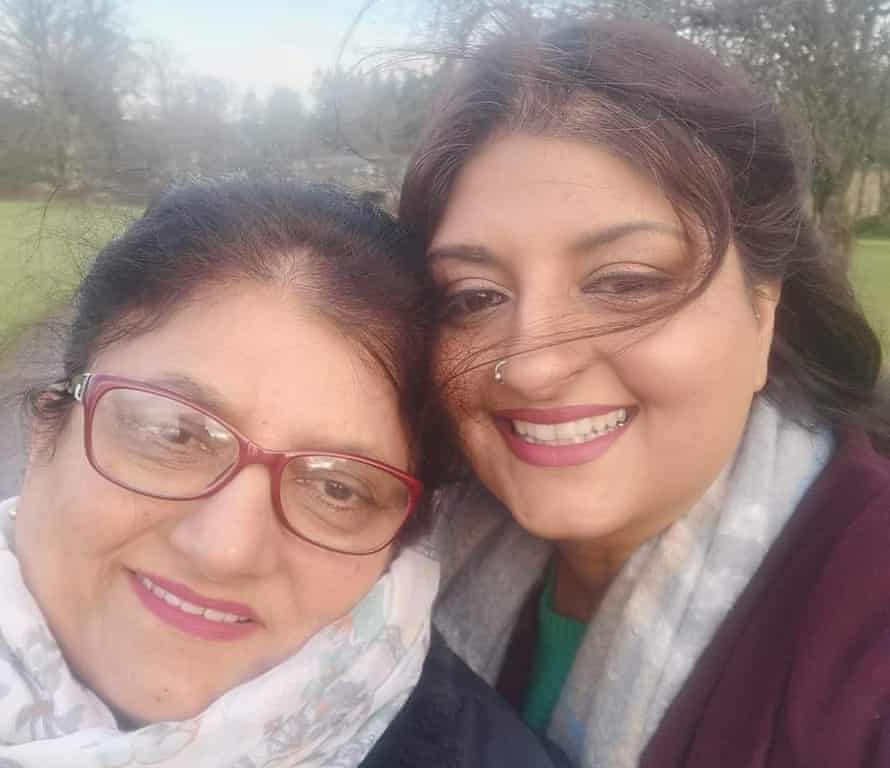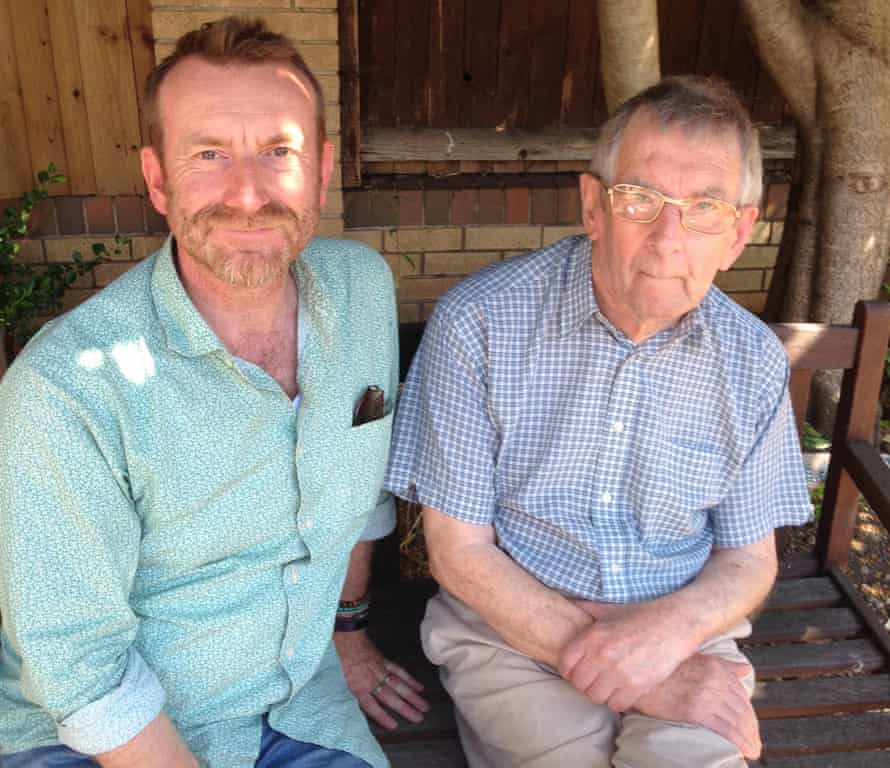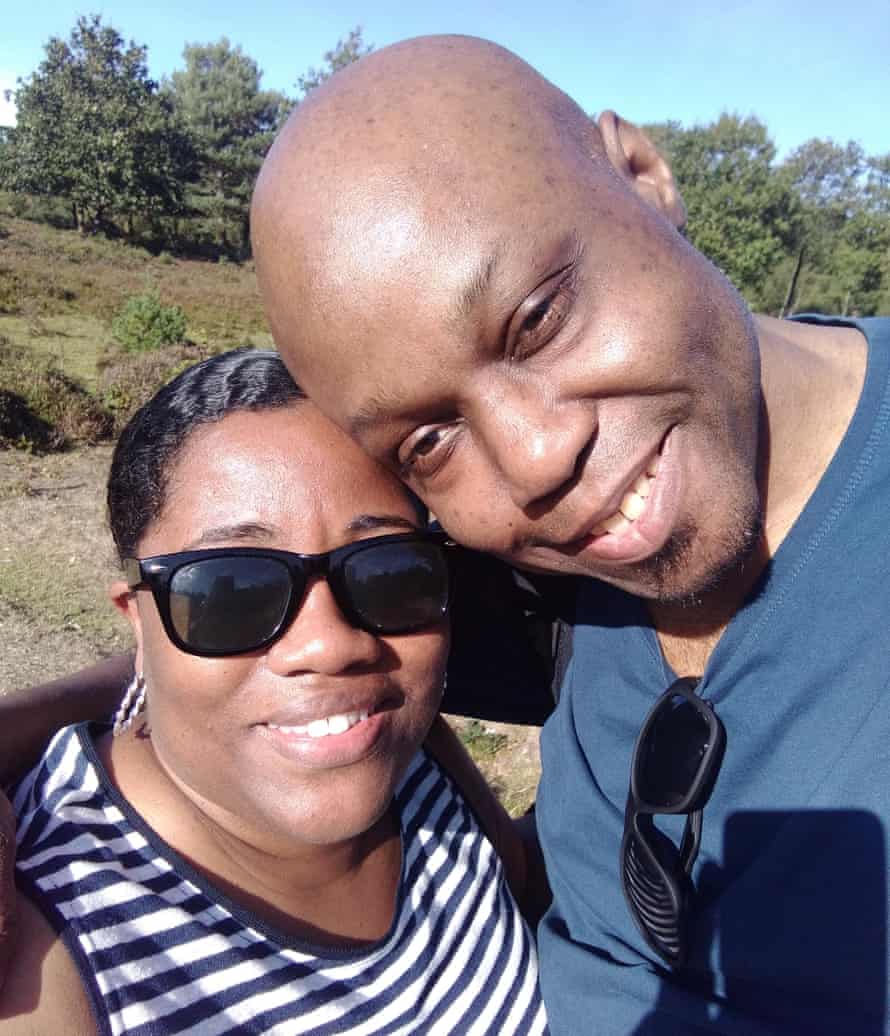The first report of a death from Covid-19 on British soil came on 5 March. I had other things on my mind at the time: my 78-year-old father, Oliver, had gone into hospital that morning for planned but major surgery. He’d set out at 6.40am, pulling the front door shut with its distinctive thwuck and wheeling his carefully packed suitcase to the waiting taxi. He left the house he’d lived in for more than 50 years tidy enough, but paused for his return: half-read books open by his bed, a pile of paperwork on his desk, jumpers folded on a chair. He expected to be home a week later.
The operation, to fix a complication from earlier bowel cancer surgery, was a success, but his recovery quickly became messy. Each day seemed to bring a new problem, and he began showing signs of delirium. One day – after he’d rung me, panicking, to say a voice had told him he was dying – I raced to the hospital to be told he might not survive. His heart rate had rocketed and he had an oxygen mask clamped to his face. The doctors managed to stabilise him, but soon after that my own crisis and the one silently snowballing outside collided: my 15-month-old son got a fever, and I had to stop visiting.
I was pretty sure it was just a routine baby cold, but with community testing for coronavirus already abandoned, there was nothing to do but wait. My dad got better, then worse, then better again. Our phone calls, possible only with a nurse’s help, were brief and often muddled. One morning, I woke to find a voice message: “I can’t pretend I don’t feel completely mad,” he said, enunciating as if he were delivering lines at one of the amateur dramatics groups he got such pleasure from. “I hope I will somehow be able to become better.”

When my phone rang at 7.34am on 28 March, I knew why immediately. I was at the ward by 8am, but too late to see my father alive for a final time. Instead I got to sit, dazed, with his body. Later, doctors would decide his symptoms in the preceding days made him one of the first 3,000 victims of Covid-19. The man who had walked into the hospital had been lively, active, sociable; loved for his warmth, wit and compassion. By the time he died, I had not seen him for 10 days.
In the year since, I have grieved in what feels like a kind of hidden limbo, trapped and taunted by the very thing that landed me here. I’ve sobbed, yes, but only with my husband, or on my own. You can’t cry when no one can hug you: it’s too awkward.
I’ve also driven myself to my dad’s funeral, with its 10 distanced mourners, and sat alone at the front, reminding myself that if I touched the lectern when delivering my eulogy, I should sanitise my hands as soon as I sat down; my husband was shielding and the thought of losing him, too, terrified me. I’ve endlessly calculated infection risk, a tiny hammer in my head pounding out distances, percentages and incubation periods. During the second wave, when the death rate once again topped 1,000 a day, I was so agitated that it seemed impossible to breathe deeply. The minute number of hugs I’ve dared indulge in outside my household have been weird and fleeting, side-by-side with masked faces turned outwards. I have no grave or headstone to visit. My father’s ashes are in a cardboard box, in a bag, on my bedroom floor. While hundreds of people are still dying every week, I don’t feel he is any more at peace than I am.
That first lockdown, with its blitz spirit and camaraderie, played out in a parallel universe to mine. Joe Wicks, Zoom quizzes and angst over sourdough starters were alien to me. I clapped for carers only once; I was dimly aware of a lot of excitement about an old man walking round his garden. My husband cut into his working hours to give me breaks from looking after our two sons, but still I struggled to offer them much of myself. As an only child whose parents separated when I was very young, I felt desperately lonely in my grief.
Yet for all the misery of that period, the easing of restrictions brought challenges, too. In the strange, shut-down landscape of lockdown, the hush in the empty streets made it feel as if everyone else was in mourning as well. When the world suddenly reopened, the loss was sharper, and the divide between me and what felt like everyone else much more obvious. It wasn’t until the news of Dominic Cummings’ lockdown-busting trip to Durham broke, and others whose loved ones had died alone spoke out in anger, that I grasped I was not the only one. Joining a couple of Facebook groups was a revelation, including one run by Covid-19 Bereaved Families for Justice, campaigners for a statutory public inquiry into the government’s handling of the pandemic.
Around the anniversaries of the earliest deaths, I wanted to talk to those who, like me, had suffered losses in the chaos and fog of those first weeks. It’s a complicated time for us first-wavers, this moment when a supposed return to normality is being triumphantly timetabled, just as we’re contemplating a year without our dead. After all this time trying to grieve without the comfort of traditional rituals, the company of friends and simple physical touch, a chance to be allowed some of this might seem welcome. But for many there’s a fear that, as the country rushes to slough off the memory of this awful period and heads for pubs, clubs and foreign beaches, the sheer scale of the loss of life will be forgotten, too.
“It feels like Mum left in the middle of dinner and just didn’t come back,” Gurcharan Virdee tells me over Zoom. Narinder was 68, and a team leader at a Coventry automotive factory when she was hospitalised with Covid at the end of March. She waited for a bed, alone in A&E without a phone, for seven hours; when Gurcharan rang at 9.30pm, a nurse said they were just wheeling her into her room, and that she was fine. Overnight, Narinder deteriorated and was put on a ventilator. She died five days later.
People die suddenly all the time: they have heart attacks and car accidents; they suffer terrible violence. But what marks Covid-19 out is the way it has kept people apart from its victims while they are still alive. For those left behind, much of the pain comes from wondering what they must have been feeling in those lost hours, days, even weeks.
That day her mum was in A&E has played round and round in Gurcharan’s head. “I don’t know who she spoke to, what she did,” she says. “Did someone give her a cup of tea, was she hungry? Did she think, ‘I want to ring my family’?”
Gurcharan had asked the hospital to call her with updates, because her father was unwell with Covid himself; but they had rung him in the small hours when Narinder was to be put on the ventilator, and he’d missed the call. Later, the family were told Narinder had been coherent at that point. “They said, ‘Your mum was a lovely lady,’” Gurcharan says. “If that had happened during the day, Mum could probably have called; we could have spoken to her. Apparently she was laughing and joking. And they put this invasive tube down her throat and put her in an induced coma, which she never woke up from. And that pinches me so much.”

So much of this is about missed connections, about people slipping first out of sight and contact, then out of the world. I think of that morning I arrived at the hospital after my dad had died; I was taken aback to find his hand still warm and soft enough to wrap around my own. “It’s only just happened,” a passing nurse reminded me.
For those like Gurcharan, who never even saw a body, accepting these unexpected deaths has been even harder. “I couldn’t connect the dots,” she says of the funeral, streamed to wider family but attended by only her father and his four daughters. “I kept thinking, ‘Is that Mum in there, then?’” Her teenage cousin had recently died, too – though not from Covid – and it was only the difference between the two coffins that made it stick. “My cousin was really tall, and his coffin was massive. Mum was only 4ft 10in, and her coffin was tiny, so I thought, well, it must be her.”
Covid restrictions meant forgoing rituals such as washing and dressing Narinder’s body, and the Sikh custom of afsos, opening the family home up for relatives, friends and neighbours to pay their respects. It would have been cathartic to spend time with the women Narinder worked with, who all adored her, Gurcharan says. “It would have helped me so much.”
She can’t bear it when friends share Covid jokes and memes, post conspiracy theories or flaunt pictures of rule-breaking get-togethers. “It’s everywhere,” she says. “You just think, ‘Jeez, look what’s happened to us, don’t show off on social media.’ I feel like Covid has made death a joke. You wouldn’t joke about cancer.”
She remembers a man who had accused her of getting too close to him in a supermarket, taking his mask off to laugh with the cashier. “I was like a kettle, I was boiling,” she says.
How does she feel about moving out of lockdown again? “Awful, and anxious.” She thinks the UK’s vaccination programme will make Covid all about a success story, not those who died. “People will be like, ‘Yeah, it was bad, but at least we’re all protected now,’” she says. “That’s what’s made me really bitter.” When she went to get vaccinated, she overheard a woman talking about how everything would be back to normal soon. “I felt like saying to her: ‘What is your normal? Because I don’t have a normal.’”
Narinder loved the cinema, lipstick and the rain, and went often to the local temple. “For such a loud lady, she went in the quietest way, and it just doesn’t feel right,” Gurcharan says. In December, Gurcharan launched an Indian food business, Nindy’s Rasoi (Nindy was Narinder’s nickname and rasoi means kitchen in Punjabi) showcasing the home cooking her mother taught her. “Mum just disappeared,” she explains. “I want to put her back on the map.”
“There hasn’t been bereavement like this in living memory,” says Dr Lucy Selman, co-lead of a longitudinal study into loss during the pandemic. It’s not just the nature of Covid deaths that makes the experience unique in many ways – their suddenness, with victims often on ventilators, and families unable to say goodbye, or having to do it in PPE or via video call – but what comes after: fears that other relatives will get the virus, guilt that maybe you were the one who passed it on, anxiety about catching or transmitting it. Then there’s the lack of access to normal social networks, or having to isolate. “It’s a huge amount of mental work people have to go through in addition to the grief itself.” Selman is part of the University of Bristol’s palliative and end of life care research group; her study, with Dr Emily Harrop of Cardiff University, has already found that those who suffer losses from Covid have greater problems and higher support needs in their grief.
In the first wave, Selman thinks, inconsistency around whether visiting was allowed made it even harder for families. “Hospitals and care homes reacted quite differently initially; that can give a sense of unfairness that certain people were able to see their loved ones and others weren’t.” Later, she believes, there was more focus on communication with families, reducing “that horrible sense of not knowing, and having to sit at home and wait”.
How will we memorialise our 125,000 dead? Among some of those bereaved there is anguish and disbelief that there’s been no official move to mark the staggering death toll, nor much sense of “community grief”. The only formal recognition I received of the nature of my loss was a note from Royal Mail telling me that because Covid had caused my dad’s death, I got the first three months’ redirection of his post for free. It moved me to tears, not for the £33.99, but just to know that someone, somewhere had thought, “These people are going through a hideous, shitty time – what can we do to show them we know that?”
Selman, who founded the Good Grief festival as a way of helping the public explore the subject, thinks pushing aside the losses and those left behind would be a mistake. “There’s an awful lot of anger,” she says. “People feeling abandoned, that things were mismanaged, that their loved ones shouldn’t have died, and that there’s been injustice.
“As human beings we need to tell our story, and be listened to, so that it can become one of healing, and hope. You can’t do that on your own; there needs to be some process of learning and reconciliation,” she says. “We need a sense of everyone moving forward together, not just certain segments of the population saying, ‘Well, I got through that relatively unscathed, and now I’ve got a vaccine and I’m going to carry on as if it never happened.’ And then other people who are stuck in their trauma and grief, feeling there’s no one to support them. There’s been a sense of people screaming at a wall.”
On 14 April, Steve Mitchell, an illustrator, posted a drawing of a soaring bird on his Facebook timeline, entitled I Would Fly To You. “For Dad in his care home, one million miles away,” he wrote. “And for everyone who’s separated from the ones they love.” Raymond, 86, who had dementia, would die six days later – just 45 minutes after the family were told he had coronavirus symptoms and was having difficulty breathing. Steve hadn’t seen him since 5 March. Care home residents were sitting ducks, he says. “They absolutely didn’t stand a chance.”
At first he was consumed with rage, watching the daily press briefings compulsively, even though they drove him “insane with anger”. When they stopped in late June, he felt it allowed the government and the nation to simply move on from a continuing tragedy. “The daily briefings were a symbol that there was still really important shit going on,” he says. He will never forget health secretary Matt Hancock tweeting on 14 June that there had been “only” 36 deaths on that day: “I felt physically sickened.”

Bereavement counselling helped Steve find a way to live with his anger, but he would hate to no longer feel it. “It’s not an anger I regret,” he says. “It’s an anger I need, because it’s a way of honouring my dad.”
When the full force of the second wave hit in January, Steve realised he was having a physiological reaction to the sight of Hancock back at the same press briefing podium. “It makes it nightmarish; it’s so cruel,” he says. “The same people who’ve mismanaged it throughout are still there, and the feeling in my chest was the same feeling I had when they were talking about my dad as one of those numbers.”
He understands why people want to move on, but not when they don’t seem to see beyond their own situations. “When I hear people say they can’t wait for lockdown to end, I think, where’s the bit that says, ‘I can’t wait for people to stop dying’?”
After the dementia took Raymond’s power of speech, hand-holding became a crucial part of their time together at the care home in Leeds. Steve would photograph their hands interlinked, and send the pictures to his two sisters. “That became hugely symbolic,” he says. But it brings back to him the differences between his father’s death and his mother’s, after a suspected stroke, 15 months earlier, when the siblings were able to gather at her bedside. “Nobody held Dad’s hand at the end,” he says.
Some people did get a chance to say goodbye. Tricia was glad she did, but describes it as traumatic nonetheless. Her 45-year-old partner, Sean Mitchell, had been on a ventilator in Charing Cross hospital in London for almost six weeks when the nurses dressed her in full PPE, on the morning of 2 May. “They were saying, ‘I’m so sorry’ and, ‘You’ll be all right.’ I had my arms out, they were putting boots on me, a mask and a visor.”
When she saw Sean, he looked peaceful and like himself, just with a bit more stubble. She held his hand, told him not to worry, that everyone would be OK, that they all loved him. “I was trying to stroke his face but because I had the gloves on it didn’t feel the same, and because I had the visor on I couldn’t quite see him properly,” she says. After a while she realised his hand was no longer warm.

She still doesn’t know how she will recover from those locked-down weeks when Sean, a musician, was in hospital, and she was at home with her 10-year-old daughter Maia, dealing with the rollercoaster of updates on his condition. She struggled to sleep or eat, and had to block out all news. “I needed to have cuddles, or someone to come round and let me sleep, or have Maia,” she says. But the rules said no one could help them.
When she went back to her job teaching vulnerable young people at a pupil referral unit in June, Tricia found it hard to cope. She was advised to have counselling, but there was a waiting list. “I needed support then to get me through it,” she says. She backs Bereaved Families for Justice’s call for investment in specific mental health support for those bereaved by Covid-19.
After lockdown was lifted, she found it difficult to go out. “I couldn’t understand why people wanted to go and mix,” she says. “It’s like, would you rather be alive” – she lets out an exasperated laugh – “or would you rather have a pint of beer? What is it? Because I’ve been through this and I know it’s not nice. Having drinks – you can do it at home. It’s not the end of the world. Losing somebody is the end of the world.
“[The government] are meant to protect us,” she adds with a quiet anger. “The most vulnerable people in our society have succumbed to this, and that’s just not right.”
Joining an online coaching group for widows helped her, as has EMDR, a trauma therapy offered free by a generous practitioner. But she finds it difficult to cry, because she has to be strong for Maia, who loved Sean like a father – and “God knows what would happen” if she let go. All this time and pain later, even though she now has a support bubble, she has still not risked a hug from anyone but her daughter.
Month after month, I have returned to my dad’s house to slowly peel away the layers of his existence there, sifting through everything from discarded shopping lists – “cheese, apples, grapes, anything else tasty” – to the trappings of a lifetime’s dedication to literature, cricket and political causes. Despite having no faith that allows me to think the dead still exist, I came to believe he remained there in some way, and cried when I realised that when I no longer had the house, I wouldn’t know where to find him. I understood then that leaving must mean taking him with me, not saying goodbye.
When you can’t tend to someone as they’re dying, you transfer that urge elsewhere; I found myself polishing windows, planting bulbs, devoting hours to finding new homes for everything. We are all looking for ways to honour the people who have been cheated of so much by the virus, their vanishing barely able to be marked. Gurcharan has Nindy’s Rasoi, and Steve his anger. Tricia tries to push herself outside her comfort zone, as Sean always encouraged her to. Others get tattoos, or create elaborate displays of the yellow hearts adopted as a symbol of Covid bereavement. Some, with a courage I’m in awe of, devote themselves to holding the government to account.
By the time this article is published, the daffodils will be in full bloom in the garden, and I will have left the house for the last time. I will have told my dad it’s finally time to go, and that he is coming with me. I will have pulled the door shut and listened for the thwuck. I hope it will mark the start of a new chapter in my grief. But I know, too, that collectively, there is a much longer journey ahead.
This content first appear on the guardian
